AWM41 1013 - [Nurses Narratives] Head Sister N C Morrice - Part 1
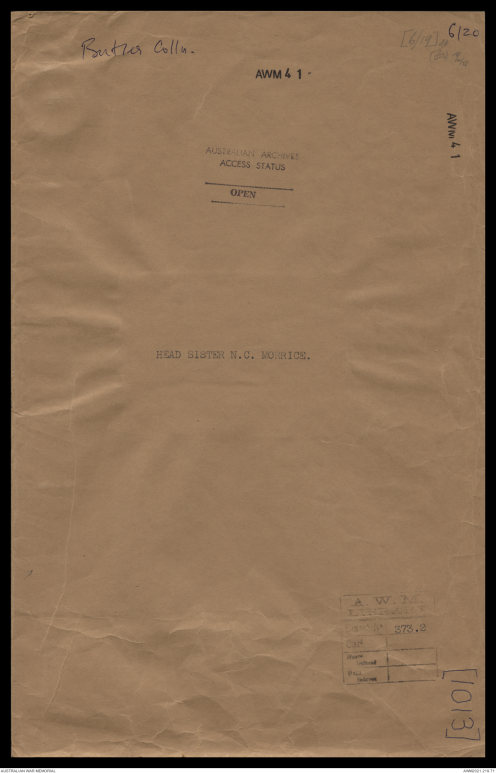
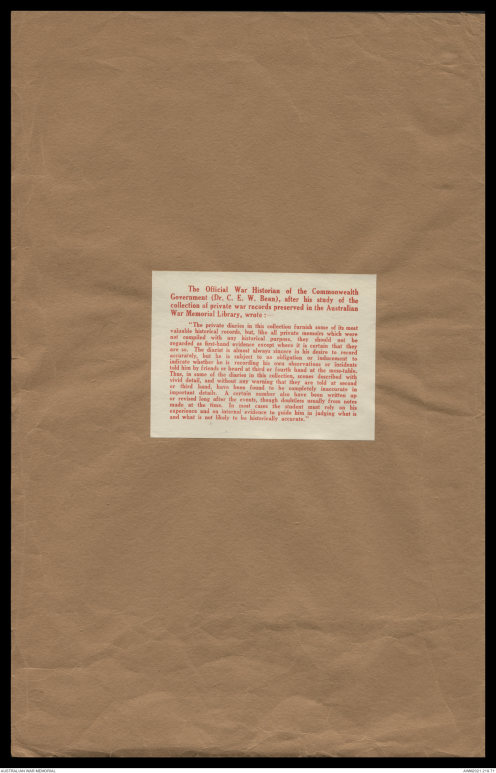
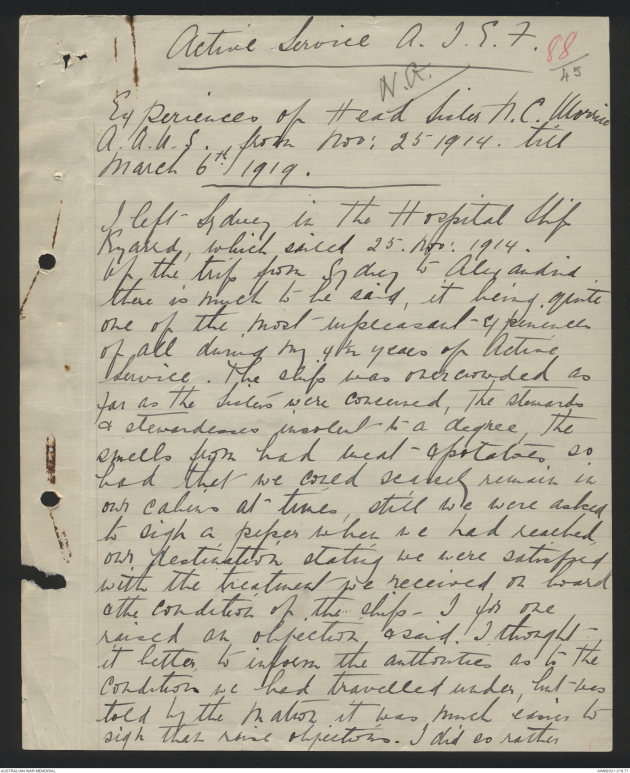
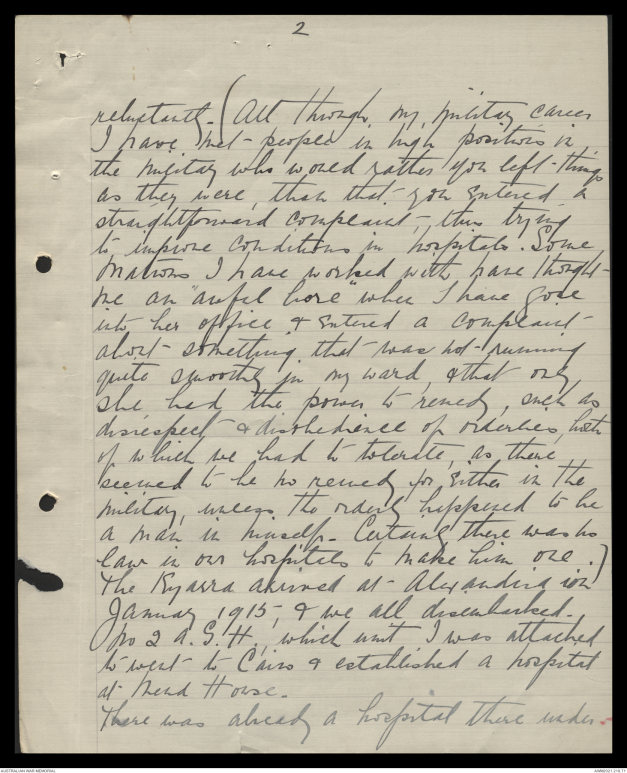
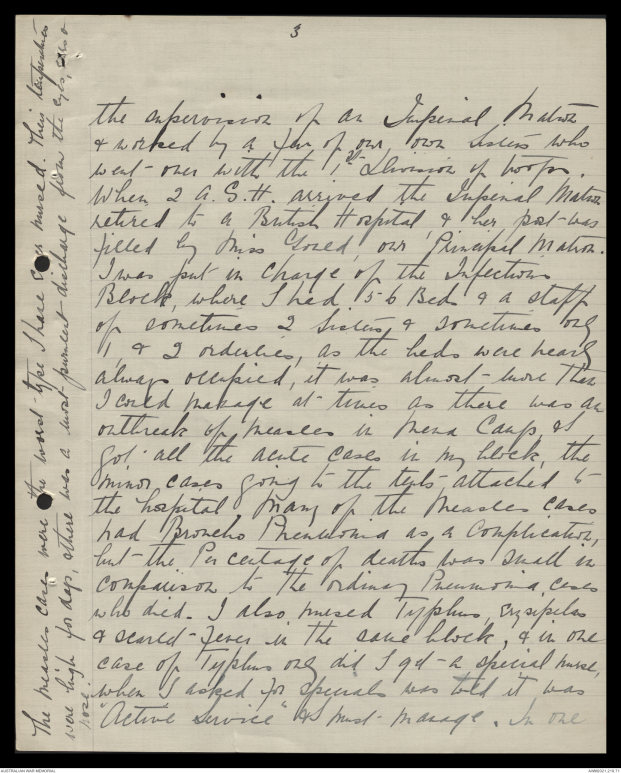
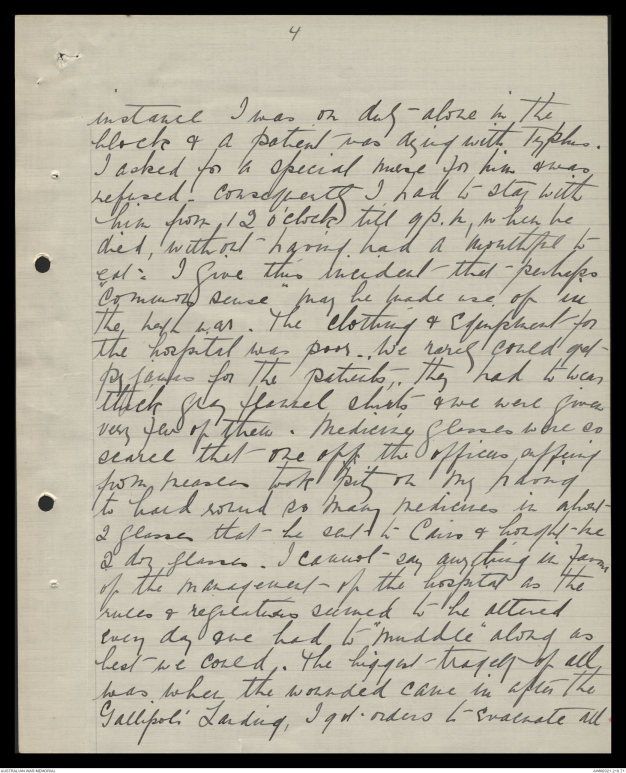
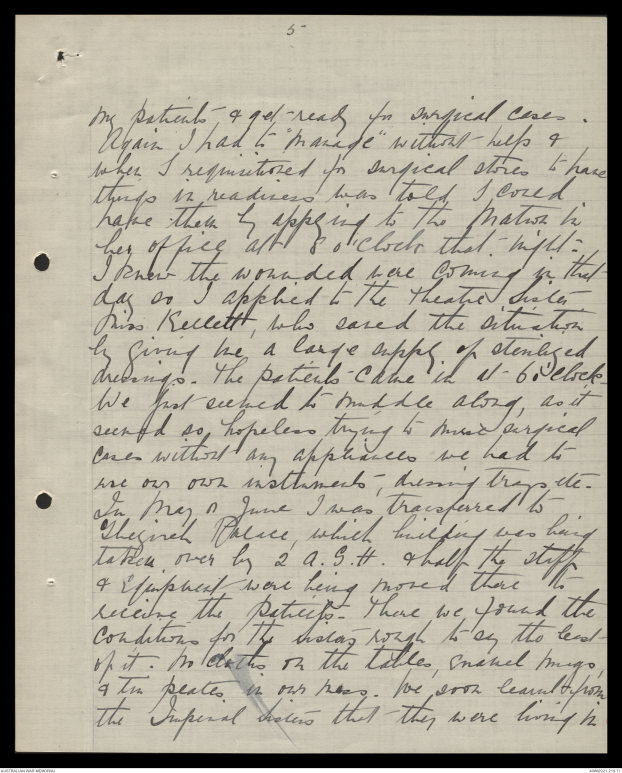
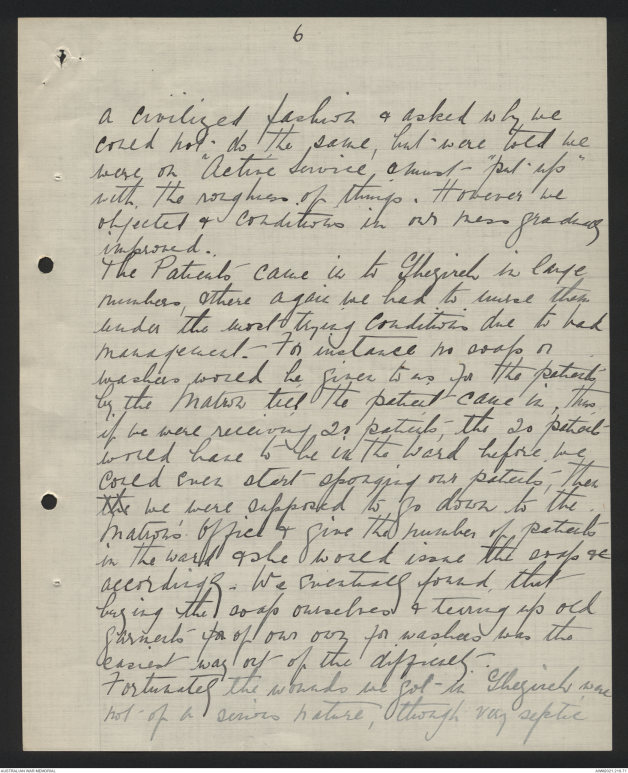
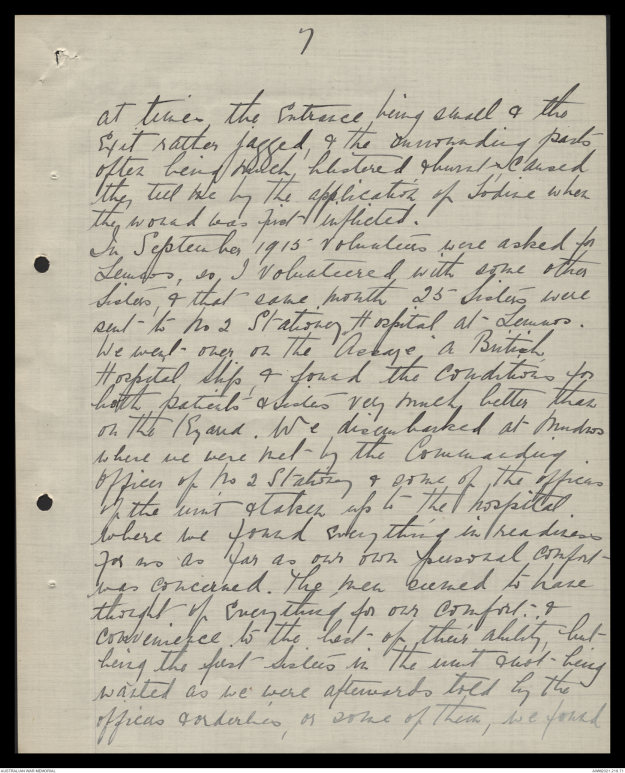
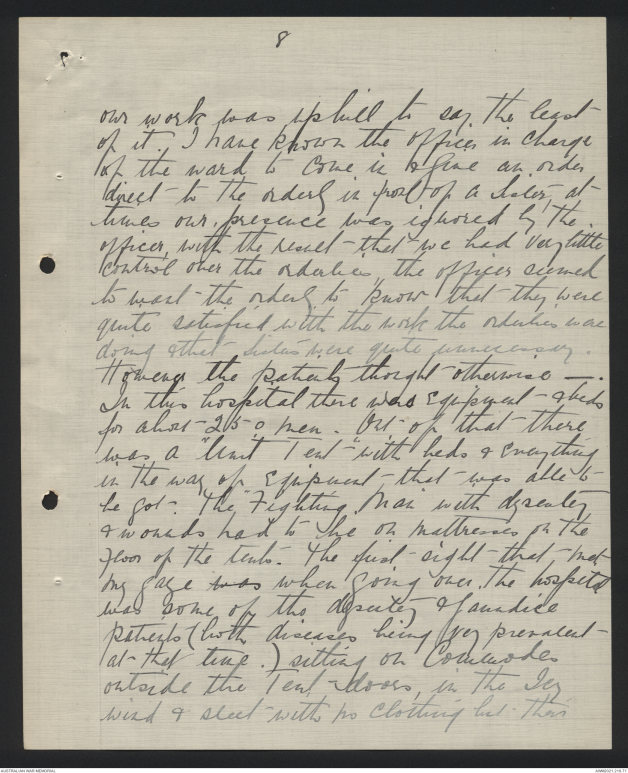
6/20
[6/19]AA
Bn [[??]]
AWM 4 1
Butler Colln.
AWM 4 1
AUSTRALIAN ARCHIVES
ACCESS STATUS
OPEN
HEAD SISTER N.C. MORRICE.
AWM
LIBRARY
373.2
[1013]
The Official War Histories of the Commonwealth
Government (Dr. C. E. W. Bean), after his study of the
collection of private war records preserved in the Australian
War Memorial Library, wrote :-
"The private diaries in this collection furnish some of its most
valuable historical records, but like all private memoirs which were
not compiled with any historical purpose, they should not be
regarded as first-hand evidence except where it is certain that they
are so. The diarist is almost always sincere in his desire to record
accurately, but he is subject to no obligation or inducement to
indicate whether he is recording his own observation or incidents
told him by friends or heard at third or fourth hand at the mess-table.
Thus, in some of the diaries in this collection, scenes described with
vivid detail, and without any warning that they are told at second
or third hand, have been found to be completely inaccurate in
important details. A certain number also have been written up
or reviewed long after the events, though doubtless usually from notes
made at the time. In most cases the student must rely on his
experience and on internal evidence to guide him in judging what is
and what is not likely to be historically accurate."
Active Service A.J.G.F.
88/45
N.G.
Experiences of Head Sister N.C. Morrice
A.A.N.S. from Nov: 25 1914. till
March 6th 1919.
———————————————
I left Sydney in the Hospital Ship
Kyarra, which sailed 25. Nov: 1914.
On the trip from Sydney to Alexandria
there is much to be said, it being quite
one of the most unpleasant experiences
of all during my 4½ years of Active
Service. The ship was overcrowded as
far as the Sisters were concerned, the stewards
& stewardesses insolent to a degree, the
smells from bad meat & potatoes, so
bad that we could scarcely remain in
our cabins at times, still we were asked
to sign a paper when we had reached
our destination stating we were satisfied
with the treatment we received on board
& the condition of the ship – I for one
raised an objection & said. I thought
it better to inform the authorities as to the
conditions we had travelled under, but was
told by the Matron it was much easier to
sign than raise objections. I did so rather
2
reluctantly. (All through my military career
I have met people in high positions in
the military who would rather you left things
as they were, than that you entered a
straightforward complaint, thus trying
to improve conditions in hospitals. Some
Matrons I have worked with have thought
me an “awful bore” when I have gone
into her office & entered a complaint
about something that was not running
quite smoothly in my ward, & that only
she had the power to remedy, such as
disrespect & disobedience of orderlies, both
of which we had to tolerate, as there
seemed to be no remedy for either in the
military, unless the orderly happened to be
a man in himself – Certainly there was no
law in our hospitals to make him one.)
The Kyarra arrived at Alexandria in
January 1915, & we all disembarked.
No 2 A.G.H., which unit I was attached
to went to Cairo & established a hospital
at Mena House.
There was already a hospital there under
3
the supervision of an Imperial Matron
& worked by a few of our own Sisters who
went over with the 1st Division of troops.
When 2 A.G.H. arrived the Imperial Matron
retired to a British Hospital & her post was
filled by Miss Gould, our Principal Matron.
I was put in Charge of the Infectious
Block, where I had 56 Beds & a staff
of sometimes 2 Sisters & sometimes only
1, & 2 orderlies, as the beds were nearly
always occupied, it was almost more than
I could manage at times as there was an
outbreak of measles in Mena Camp & I
got all the acute cases in my block, the
minor cases going to the tents attached to
the hospital. Many of the Measles cases
had Broncho Pneumonia as a Complication,
but the Percentage of deaths was small in
comparison to the ordinary Pneumonia cases
who died. I also nursed Typhus, Erysipelas
& Scarlet fever in the same block, & in one
case of Typhus only did I get a special nurse,
when I asked for specials was told it was
“Active Service” & I must manage. In one
[*The measles cases were the worst type I have ever nursed. Their temperatures
were high for days, & there was a most purulent discharge from the eyes, ears &
nose.*]
4.
instance I was on duty alone in the
block & a patient was dying with Typhus.
I asked for a special nurse for him & was
refused. Consequently I had to stay with
him from 12 o’clock till 9p.m, when he
died, without having had a mouthful to
eat. I give this incident that perhaps
"common sense” may be made use of in
the [[health war?]]. The clothing & equipment for
the hospital was poor. We rarely could get
pyjamas for the patients, they had to wear
thick grey flannel shirts & we were given
very few of them. Medicine glasses were so
scarce that one off the officers suffering
from measles took pity on my having
to hand round so many medicines in almost
2 glasses that he sent to Cairo & bought me
2 doz glasses. I cannot say anything in favour
of the management of the hospital as the
rules & regulations seemed to be altered
every day & we had to “muddle” along as
best we could. The biggest tragedy of all
was when the wounded came in after the
Gallipoli Landing, I got orders to evacuate all
5
my patients & get ready for surgical cases.
Again I had to “manage” without help &
when I requisitioned for surgical stores to have
things in readiness was told I could
have them by applying to the Matron in
her office at 8 o’clock that night.
I knew the wounded were coming in that
day so I applied to the theatre Sister
Miss Kellett, who eased the situation
by giving me a large supply of sterilized
dressings. The patients came in at 6 o’clock.
We just seemed to muddle along, as it
seemed so hopeless trying to nurse surgical
cases without any appliances we had to
use our own instruments, dressing trays etc.
In May or June I was transferred to
Ghezireh Palace, which building was being
taken over by 2 A.G.H. & half the staff
& equipment were being moved there to
receive the patients. There we found the
conditions for the Sisters rough to say the least
of it. No cloths on the tables, enamel mugs,
& tin plates in our mess. We soon learnt from
the Imperial Sisters that they were living in
6
a civilized fashion & asked why we
could not do the same, but were told we
were on “Active Service & must “put up”
with the roughness of things. However we
objected & conditions in our mess gradually
improved.
The Patients came into Ghezireh in large
numbers, & there again we had to nurse them
under the most trying conditions due to bad
management. For instance no soap or
washers would be given to us for the patients
by the Matron till the patient came in, thus
if we were receiving 20 patients, the 20 patients
would have to be in the Ward before we
could even start sponging our patients, Thenthe we were supposed to go down to the
Matron’s Office & give the number of patients
in the ward & she would issue the soap &c
accordingly. We eventually found that
buying the soap ourselves & tearing up old
garments for of our own for washers was the
easiest way out of the difficulty.
Fortunately the wounds we got in Ghezireh were
not of a serious nature, though very septic
7
at times the entrance being small & the
exit rather jagged, & the surrounding parts
often being much blistered & burnt, caused
they tell me by the application of Iodine when
the wound was first inflicted.
In September 1915 volunteers were asked for
Lemnos, so I volunteered with some other
Sisters, & that same month 25 Sisters were
sent to No 2 Stationary Hospital at Lemnos.
We went over on the "Assaye" a British
Hospital Ship & found the conditions for
both patients & Sisters very much better than
on the Kyarra. We disembarked at Mudros
where we were met by the Commanding
Officer of No 2 Stationary & some of the officers
of the unit & taken up to the hospital
where we found everything in readiness
for us as far as our own personal comfort
was concerned. The men seemed to have
thought of everything for our comfort &
convenience to the best of their ability, but
being the first Sisters in the unit & not being
wanted as we were afterwards told by the
officers & orderlies, or some of them, we found
8
our work was uphill to say the least
of it. I have known the officer in charge
of the ward to come in & give an order
direct to the orderly in front of a Sister, at
times our presence was ignored by the
officer, with the result that we had very little
control over the orderlies, the officer seemed
to want the orderly to know that they were
quite satisfied with the work the orderlies were
doing & that Sisters were quite unnecessary.
However, the patients thought otherwise -.
In this hospital there was equipment & beds
for about 250 men. Out of that there
was a “Unit Tent” with beds & everything
in the way of equipment that was able to
be got. The “Fighting Man” with dysentery
& wounds had to be on mattresses on the
floor of the tents. The first sight that met
my gaze was when going over the hospital
was some of the dysentery & jaundice
patients (both diseases being very prevalent
at that time.) sitting on Commodes
outside the Tent doors, in the Icy
wind & sleet with no clothing but their
 Sam scott
Sam scottThis transcription item is now locked to you for editing. To release the lock either Save your changes or Cancel.
This lock will be automatically released after 60 minutes of inactivity.